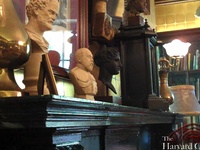Those close to him said that Gomes’ door was always open to students and that when they walked into his office he always took the time to steer them in the right direction.
“When he talked to a student, he or she would think he was the only person on this whole earth,” Randolph said.
RELIGION AT HARVARD
A skilled preacher, Gomes was a master at the art of the pause, Epps Fellow Nathaniel P. Katz said.
“What made him extraordinary was his ability to synthesize the gospel or the text in such a way that was both meaningful and relevant and memorable,” Katz said. “I’ve never seen a greater extemporaneous speaker all of my life.”
Multimedia
His powerful Sunday sermons helped maintain a religious presence at Harvard, while interest in churches diminished at other universities.
When Gomes was appointed the Pusey minister at Memorial Church in 1974, religion’s popularity across the United States was at a low point, especially on college campuses, said Jonathan C. Page ’02, a former Epps fellow.
At the time, Harvard, as an institution, was known for its lack of religious fervor, Page said. Gomes wanted to change that.
He insisted that religion be an option for undergraduates on campus by creating an atmosphere open to the practice of religion and supporting other religious groups as well.
During his tenure, Gomes turned Memorial Church into a center of religious and student life, a place where people of different religious convictions could feel welcome and practice under the same roof.
“He left an institutional legacy in that fact that Memorial Church has always been an important centerpiece of Harvard’s culture institutionally,” McCarthy said, “but it serves a broader public and a broader world.”
McCarthy added that this was no small feat in an age when religious debates were often “so violent and so vicious.” Gomes would ensure that religion continues to exist at Harvard in the long run.
His enthusiasm for religion at Harvard carried over into the class he taught about preaching, a course in which he sought to pass on his talent for oratory.
Gomes would tell his students to seek the diamond instead of the string of pearls—to find one thing worth saying and to say it multiple times.
“Love—not the romantic sense of love but the sense of unconditional love that we receive from God—should be the center of what we do and who we are,” Katz said was one of Gomes’ most important lessons.
Katz said that Gomes believed anyone who comes to Harvard should feel like they have something to contribute to the Harvard tradition—they can come here and feel like Harvard belongs to them, sharing a love of Harvard through the love of God.
“The love that we receive is a gift. It’s great. We don’t have to do anything to earn it,” Katz said. “God’s gift to us is this unconditional love.”
Whether it be for the student who had lost a friend, a young man in need of a role model, or each new crop of incoming freshmen, Gomes, too, possessed an unconditional love. It could be heard in his voice.
—Staff writer Justin C. Worland can be reached at jworland@college.harvard.edu.
—Staff writer Xi Yu can be reached at xyu@college.harvard.edu.









